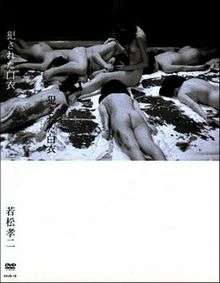Violated Angels
Violated Angels (犯された白衣,, Okasareta Hakui) is a film made by controversial Japanese director Kōji Wakamatsu in 1967. Wakamatsu's most famous film,[1] it is based on the mass murder spree of Richard Speck in 1966.[2][3]
| Violated Angels | |
|---|---|
 | |
| Directed by | Kōji Wakamatsu |
| Produced by | Kōji Wakamatsu |
| Written by | Masao Adachi Jūrō Kara Kōji Wakamatsu |
| Starring | Jūrō Kara Keiko Koyanagi Miki Hayashi |
| Music by | Koji Takamura |
| Cinematography | Hideo Itoh |
| Edited by | Fumio Tomita |
| Distributed by | Wakamatsu Productions |
Release date |
|
Running time | 56 minutes |
| Country | Japan |
| Language | Japanese |
Plot
A young man breaks into a nurses' rooming house and one-by-one kills off the nurses therein. In the tradition of Wakamatsu's other Pinku eiga, there is lots of sexuality and nudity. However most of the actual murders take place off screen.
Cast
- Jūrō Kara as The Handsome Boy
- Keiko Koyanagi as The Head Nurse
- Miki Hayashi as Nurse A
- Shoko Kidowaki as Nurse B
- Makiko Saegusa as Nurse C
- Kyoko Yoyoi as Nurse D
- Michiko Sakamoto as The Young Girl
- Gusaku Satô as Riot Policeman
- Shûzô Tanaka as Riot Policeman
- Matajûrô Arafune as Riot Policeman
- Kentarô Aichi as Riot Policeman
Production
The film was shot in just three days, probably much of it improvised and because of the low budget, many of the actresses were not professionals.[4]
Criticism
Like many films of this nature, Violated Angels was called anti-feminist and misogynistic by some critics. In Film As A Subversive Art, a book on underground cinema, Amos Vogel praises Wakamatsu's artistic talent, yet pans the film for its "...anti-feminist sadism which is not based on any ideological explanation and finally contributes misanthropic flavour to his work."
Notes
- Weisser, Thomas; Yuko Mihara Weisser (1998). Japanese Cinema Encyclopedia: The Sex Films. Miami: Vital Books : Asian Cult Cinema Publications. p. 499. ISBN 1-889288-52-7.
- Weisser, p.101.
- Sharp, Jasper (2008). Behind the pink curtain: The complete history of Japanese sex cinema,. UK: FAB Press. p. 91. ISBN 1-903254-54-X.
- Sharp, p. 86
References
- Firsching, Robert. "Okasareta Ryakui[sic]". Allmovie. Retrieved 2007-10-02.
- Fuchs, Christian (2002) [1996]. Bad Blood. Creation Books.
- "VIOLATED ANGELS". Complete Index to World Film. Retrieved 2007-10-02.
- "Violated Angels" (in French). pinku.cho-yaba.com. Retrieved 2007-10-17.
- Vogel, Amos (2005) [1974]. Film As A Subversive Art. Art Pub Inc.
External links
- Violated Angels on IMDb
- 犯された白衣 at the Japanese Movie Database (in Japanese)
- Violated Angels at AllMovie